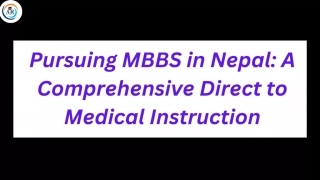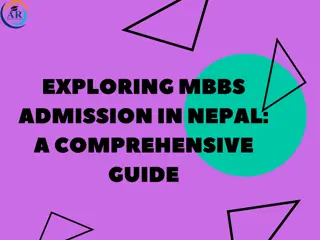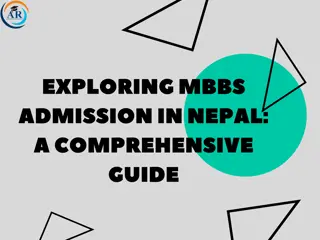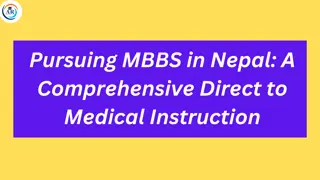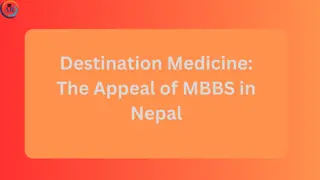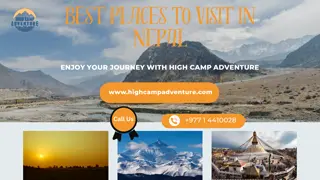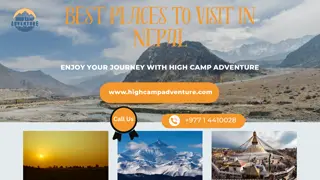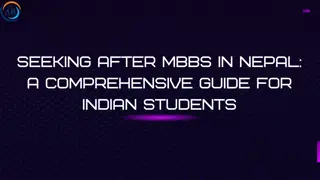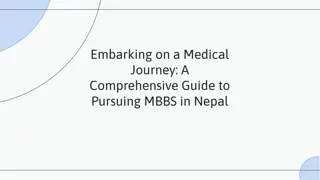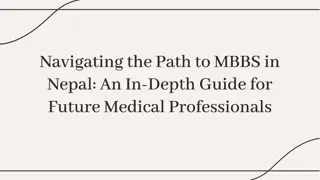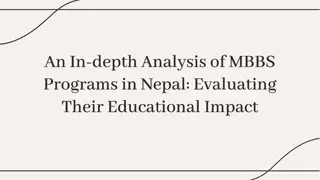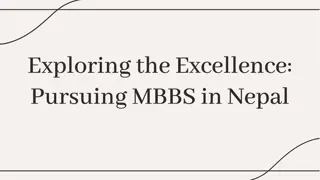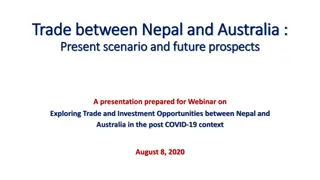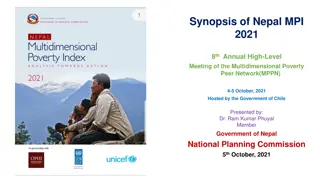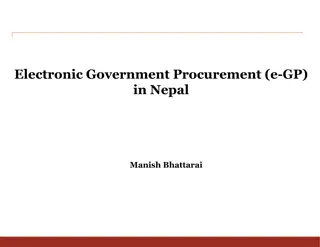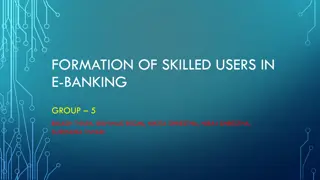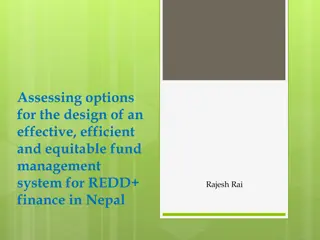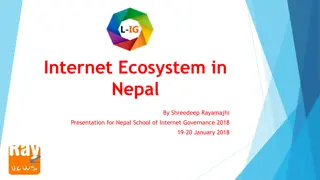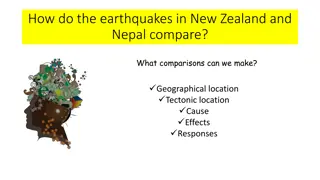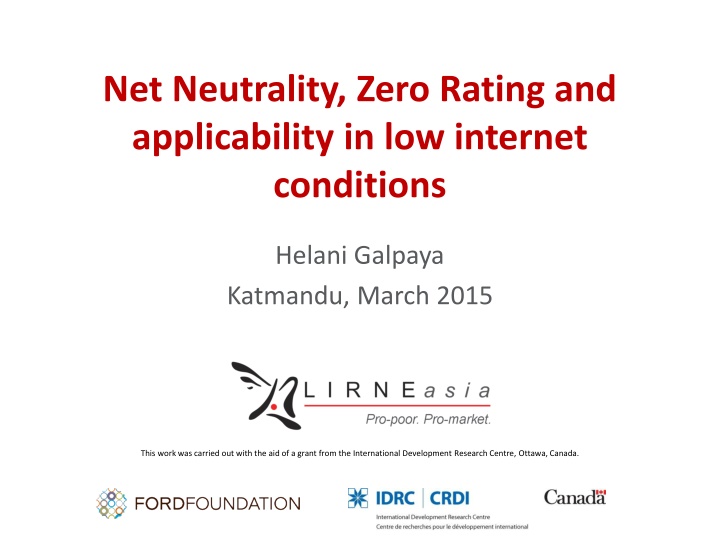
Internet Neutrality and Zero Rating in Low Internet Conditions
Explore the dynamics of net neutrality, zero rating, and their implications in low internet conditions through the lens of a study conducted in Kathmandu in March 2015 with the support of the International Development Research Centre, Ottawa, Canada. Dive into the concepts of generative networks, traffic routing, peering and transit agreements, and the impact of controlling the internet as a source of power for governments. Understand the debates on video traffic distribution and the roles of service providers and content suppliers in the ecosystem.
Download Presentation

Please find below an Image/Link to download the presentation.
The content on the website is provided AS IS for your information and personal use only. It may not be sold, licensed, or shared on other websites without obtaining consent from the author. If you encounter any issues during the download, it is possible that the publisher has removed the file from their server.
You are allowed to download the files provided on this website for personal or commercial use, subject to the condition that they are used lawfully. All files are the property of their respective owners.
The content on the website is provided AS IS for your information and personal use only. It may not be sold, licensed, or shared on other websites without obtaining consent from the author.
E N D
Presentation Transcript
Net Neutrality, Zero Rating and applicability in low internet conditions Helani Galpaya Katmandu, March 2015 This work was carried out with the aid of a grant from the International Development Research Centre, Ottawa, Canada.
The internet as a generative network Meant to be content agnostic Video, voice, books, music, etc. all can be transmitted Allowed anyone to connect at the edges With any equipment Governed by a basic set of rules Routing tables, protocols Anyone (any machine) to connect to any other machine open 2
Traffic routing and payments in best-effort networks $ $ $ $ $ $ $ $ $ $ $ $ 3
Peering & Transit: bilateral business and technical agreements Transit: one ISP (sells) connectivity to all destinations in the global internet In most cases, transit provider will carry traffic to/from its customers to other customers AND to every destination on the internet Traffic from 3rd parties to 3rd parties Defined price: usually on volume basis From customer point of view: simple relationship; paid; governed by a SLA (service level agreement) Peering: 2 providers agree to accept traffic from one another and from one another s customers (and their customers customers) No cash payments, no cash settlements (usually within 150% of agreed upon amount) No SLA 4
Internet has power. Controlling it is a source of power. For governments 5
In the US, videos (Netflix, YouTube) ~ water park At peak, > 80-90% of traffic Netflix, YouTube, Google Should ISPs (e.g. Comcast) increase the size of the pipe? Rational, yes Who should pay? 2013 WCIT debate: suppliers (e.g. Google/Netflix/YouTube) should pay the BB service providers Why is this a bad idea? 6
NETFLIX Company Y s mail server D E F Transit Network T1 Delay/throttle ISP A B C COMCAST User Y User X
Railroads, people, movement Sleepy town, rail road runs through New waterpark opens in sleepy town Visitors increase x 100 fold What should the rail network do? Increase capacity: run more trains per hour? Increase capacity: build an extra train line? Who should pay for increased capacity? The rail company? The waterpark? 8
What did Comcast (allegedly) do? How is traffic routed? Interconnection, Peering, transit Eye-ball networks (users who demand content) Content networks (providers of content) Throttling ALL traffic of transit provider Via which Video was being routed Until Peering Agreement was re-negotiated What happens to others on the network? 9
Comcasts defense vs. reality Comcast says Peering arrangements are commercially negotiated Roughly equal (or +150%) traffic If this changes, re-negotiate Because upgrading interconnection is costly Counter argument Upgrading interconnection point is cheap (new network cards is less than USD 400) Rest of the network should be upgraded 10
Was that an example of a violation of network neutrality? Were people s RIGHTs being violated? What IS net neutrality? All traffic treated equally Everyone can access everything What does this mean? No blocking? No throttling (downgraded speed) No paid prioritization? Above 3 of equal importance? 11
But are we unhappy with all traffic blocking or prioritization? Most people happy when some content is blocked by their ISP Child pornography SPAM Reasonable network traffic management Prioritizing delay-sensitive traffic (voice before e-mail) Reserving bandwidth for delay-sensitive traffic (voice over LTE) Prohibiting high-bandwidth traffic (video on airplanes) Rendering resolution dynamically (video over wireless) 12
Are these violations of NN? A country s government blocking certain types of content E.g. Certain social media (China, routinely) Block YouTube during riots in PK Differentiating speed/price bundles? 100 Mbps for USD 20 per month 200 Mbps for USD 30 per month Etc. All you can eat (uncapped) packages vs. limited (capped) packages? All you can eat was the norm in the US changing now, e.g. US iPhone packages by AT&T Not uncommon for fixed BB Rarely found in emerging Asia 13
What is Zero-Rating? Some type(s) of content does NOT count towards data cap Buy a basic (entry level) data plan, and get An unlimited (or very large) quantity of some specified content (i.e. Zero Rated ) for free (or for a nominal price) Facebook, WhatsApp or other apps/content popular as zero-rated offering Social media and certain applications/content drives usage Operators use it as a honey pot : to attract users 14
Examples Turk cell in 2010 Unlimited use of Facebook Zero (0.facebook.co and zero.facebook.co) Only text; pop up warning when user wants to view photos/videos or any link outside of Facebook Airtell India, 2010 m.facebook.com zero-rated; no other data connection/subs required Beyond FB Zero, allowed photos (not just text). But no games or chats AirCell, Idea, other operators, since end 2014 FB Zero free, OR FB App for INR 40 when you buy basic data (for about INR 100) Etc. Telenor in Myanmar since 2014 O.facebook.com free 15
Why is this attractive? To users Free content Free content that is EXTREMELY attractive (social media is most popular content) To telecom operator People are not coming online (even when prices are low) Suddenly, attractive content is offered to users Users are attracted/hooked Eventually convert to paying users To Facebook, Google and other content providers More eyeballs increased ad revenue Is there money changing hands? 16
What are the results MAU over last 30 days for m.facebook.com on AirCell IN TurkCell 6.5 million people getting online via FB Revenue/sub up 9% 34% increase in mobile Twitter use (in 2012 promotion) Aircell India 2010 promotion +2Million MAUs in 30 days Myanmar 40% of SIMs are DAUs Source: AdWeek Early indications: ZR content increases people s willingness to consume (i.e. pay for) data 17
How might ZR violate network neutrality? FB- packets are given priority/favored because they are free Are users of B at a disadvantage? What could happen?: Say avg. user consumes 0.5MB/day 5MB used up in 10 days On package A: If user is price sensitive, those on A can t go online after day 10. No internet Day 11 30 each month On package B: If user is price sensitive, he doesn t go online after day 10. But continues to use FB0 till the end of the month A period (20 days) where internet = FB0 for Package B users Is this a problem? How can it be corrected ? Banning package B? Avg. consumption (0.5 per day x 30 days) = 15 MB per month; insist all ZR plans have to offer 15MB as base package? Should we even TRY to correct this? Package A Package B 5MB per month, for Rs. 100; each additional MB Rs 50 each Same as A + unlimited 0.facebook.com (FB0) 18
How might ZR violate network neutrality? .contd. People will stay in FB. And think FB = internet. That is a disadvantage to developing country users. Their rights are violated In developed economies people came online with the full internet (everyone could access everything; every packet/byte cost the same as another) AOL/CompuServe short-lived exceptions? FB = internet is not new Indian operators: 65-85% of avg users data use is for Facebook, YouTube and WhatsApp. Before ZR phenomenon LIRNEasia and RIA research from 2011/12 19
Reported in Quartz (qz.com) Telegraph (UK), DailyMail (UK), Smithsonian.com AdWeek Investmentwatch etc. 20
Competitive dynamics: platform lock-in Facebook will become the dominant/only platform. Gives too much power to FB Network effects: FB popular more content on FB by app developers/governments/pvt sector/individual users FB even more popular Worry of Telcos (becoming the dumb pipe) FB as preferred platform Who can get on it? Apps FB approves 21
Competitive dynamics: operator walled-garden lock-in Can young app developers ever have win ? Negotiating skills with the telco (and ability to pay?) drives if you are in/not Not necessarily what the users think is best app Is this ok? AT&T s 2014 Sponsored Data program Anyone can participate (pay AT&T, then their content is ZR) Does commercial vs. non-commercial content make a difference? WikiZero thinks so Internet.org: Facebook s App of free content, Zambia FB0 + some other data (AccuWeather, Airtel, eZeLibrary, Facebook, Facts for Life, Google Search, Go Zambia Jobs, Kokoliko, MAMA (Mobile Alliance for Maternal Action), Messenger, Wikipedia, WRAPP (Women s Rights App) and Zambia uReport. Unclear if other apps can get in/ZR d 22
Competitive dynamics: At times, implementing ZR has been good; At times, banning ZR has been bad; Australia 4 large ISPs Gang of Four refusing to peer with smaller ISPs. Smaller ISPs having to buy transit high costs low roll-out ZeroRated entertainment content from top/popular channel Traffic, subscriptions increase. Network rolls out. Dominance of big guys becomes less USA MetroPCS (5th largest operator) struggling financially New package: USD40/month for unlimited voice + small amount (capped) data + ZeroRated (uncapped0 YouTube) Worked with Google to optimize Streaming NN advocates protest ZR-based plan abandoned By 2012 no option but to sell to T-Mobile (reducing competition) 23
Should regulators/policy makers act? Is it increasing welfare? Are people who would otherwise not consume, consuming due to ZR? Appears so. But strong causality not established. Is new economic activity being enabled by this? Possibly. E.g. Syntonics, US startup that manages sponsored data for others Anecdotal evidence of innovative impacts Is it having negative competitive impacts? Are people(users)/app developers/governments/firms getting pushed towards one platform? Is it reducing the possibility of alternate platforms? Evidence not conclusive; but indications are it could. 24
What might a regulatory response to ZR be? What should regulators do when evidence is unclear? Watch, research, be ready for action In the meantime: o all the other stuff that they were supposed be doing all this while increase competition at all points in the value chain, give enough spectrum decrease prices Release government data locally relevant content/apps 25


